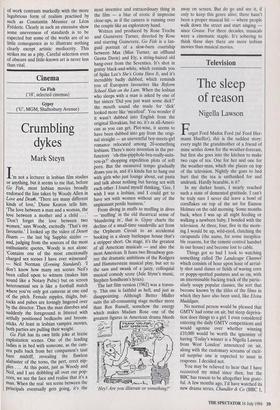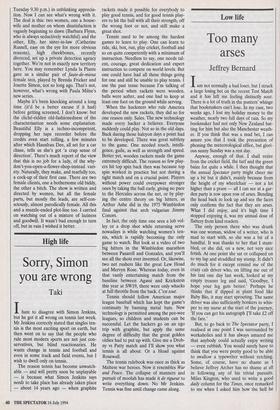Television
The sleep of reason
Nigella Lawson
Forget Ford Madox Ford (ne Ford Her- mann Hueffer), this is the saddest story: every night the grandmother of a friend of mine settles down for the weather-forecast, but first she goes into the kitchen to make two cups of tea. One for her and one for the weather-man, which she places on top of the television. Nightly she goes to bed hurt that the tea is unthanked for and undrunk. Hardly bearable, is it?
In my darker hours, I nearly reached such a state of demented gratitude. I can't be truly sure I never did leave a bowl of cornflakes on top of the set for Eamon Holmes on the odd morning. Some months back, when I was up all night feeding or walking a newborn baby, I bonded with the television. At three, four, five in the morn- ing I would be up, wild-eyed, clutching the carapunda (the name, for some inexplica- ble reasons, for the remote control handset in our house) and become lost to cable.
Things got so bad I took to watching something called The Landscape Channel which consists of hour upon hour of aerial- ly shot sand dunes or fields of waving corn or poppy-spotted pastures and so on, with an interminable backing track of the partic- ularly soupy popular classics, the sort that become known by the titles of the films in which they have also been used, like Elvira Maddigan.
No normal person would be pleased that GMTV had come on air, but sleep depriva- tion does things to a girl. I even considered entering the daily GMTV competitions and would agonise over whether winning £10,000 would be worth the ignominy of having `Today's winner is a Nigella Lawson from West London' announced on air, along with the customary screams of excit- ed surprise one is expected to issue in response. I decided not.
You may be relieved to hear that I have recovered my mind since then, but the BBC has reason to be altogether less grate- ful. A few months ago, I'd have watched its new drama series, Chandler & Co (BBC 1, Tuesday 9.30 p.m.) in unblinking apprecia- tion. Now I can see what's wrong with it. The deal is this: two women, one a house- wife and mother on whom disatisfaction is vaguely beginning to dawn (Barbara Flynn, who is always seductively watchful) and the other, Elly, her sister-in-law (Catherine Russell, easy on the eye for more obvious reasons), high cheekbones, recently divorced, set up a private detection agency together. We're not in exactly new territory here. You may remember Lynda la Plante gave us a similar pair of faute-de-tniewt female tens, played by Brenda Fricker and Josette Simon, not so long ago. That's not, however, what's wrong with Paula Milne's new series.
Maybe it's been knocking around a long time (it'd be a better excuse if it had) before getting screened, I don't know: but the cliché-ridden old-fashionedness of the characterisation needs some explanation. Beautiful Elly is a techno-incompetent, dropping her tape recorder before the credits even start rolling, a few minutes after which Hausfrau Dee, all set for a car chase, tells us she's got 'a crap sense of direction'. There's much report of the view that this is no job for a lady, of the why- don't-you-open-a-flower-shop-instead vari- ety. Naturally, they make, and tearfully too, a cock-up of their first case. There are two female clients, one a bothersome old biddy, the other a bitch. The show is written and directed by women, but all the female parts, but mostly the leads, are self-con- sciously, almost parodically female. All this and a muzzle-ended plot-line too. I carried on watching out of a mixture of laziness and goodwill. It wasn't bad enough to turn off, but in vain I wished it better.



















































 Previous page
Previous page